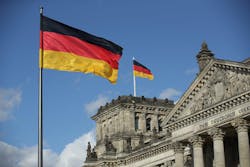With Eye on China, Germany Shields Strategic Firms Against Takeovers
Germany toughened rules on Dec.19 for non-EU share purchases or acquisitions of companies that are part of its critical infrastructure, amid growing disquiet about takeovers by Chinese firms.
The new rules allow the government greater review powers in the defense, high-tech and infrastructure sectors, including utilities and telecoms providers, for media companies.
Chancellor Angela Merkel's cabinet decided to lower the threshold where reviews apply to foreign purchase offers of 10% of such strategic companies, down from 25% now.
Germany and other EU states have voiced growing concern as Chinese companies have bought up, or purchased controlling stakes in, high-tech firms, airports and harbors.
The update strengthened government powers to review and possibly block foreign purchases and aim to "strengthen our national security," said Economy Minister Peter Altmaier.
He assured foreign investors that "companies like to invest in Germany, and we would like to keep it that way."
"But we have to be able to take a closer look when it comes to sensitive infrastructure, who buys it and what the consequences are," he said.
"Enterprises that supply us with electricity, gas, drinking water or telecommunications are of paramount importance to our coexistence. This is also true for the media sector."
Losing Knowhow
An alarm has grown in Germany about losing valuable knowhow since Chinese appliance giant Midea in mid-2016 took over German industrial robotics supplier Kuka.
In mid-2017 Germany tightened scrutiny of non-EU takeovers of strategic companies, doubling to four months the time for reviews, and broadening the range of sectors.
China issued a word of caution about the new rules, though it said they did not target a specific country.
"As protectionism and unilateralism intensifies, different parties should pay more attention to avoid sending the wrong signals to the outside world when launching any kind of policies," said Chinese foreign ministry spokeswoman Hua Chunying at a press briefing in Beijing.
"We hope Germany will create fair and open market access ... for international enterprises, including Chinese enterprises, investing in Germany," Hua said.
As major players in the global economy, both Germany and China "have shared responsibility to maintain free trade and multilateralism," she added.
'National Security
In February, Germany raised no objections when Chinese billionaire Li Shufu bought a near 10% stake in the Mercedes-Benz parent company Daimler.
However, in July, the state took a minority stake in electricity transmission firm 50Hertz, citing national security reasons, to thwart Chinese investors from buying into it.
Germany has been discussing similar protective steps at the EU level with France and Italy.
"The aim is to be able to intervene nationally, in individual cases, against state-controlled or state-financed strategic direct investments," said the economy ministry.
This could apply where the home country of the purchasing company financially supports a takeover bid at above-market prices or through political incentives.
German business groups criticized Berlin's move as overly protectionist and ultimately harmful. The Chamber of Commerce and Industry called the change "problematic", warning that it sends a "negative signal to our foreign partners".
And the Mechanical Engineering Industry Association charged that it "is politically motivated and creates additional uncertainty among foreign investors".
The economy ministry insisted that "this is not about more prohibitions but about strengthening the capacity to find out whether legitimate security interests of Germany are affected".
Germany had reviewed 80 to 100 purchase offers annually in recent years "without discrimination and regardless of origin of the buyer" and had so far never blocked an offer, he said.
This proved that "Germany remains one of the world's most open investment locations".
By Frank Zeller
Copyright Agence France-Presse, 2018
About the Author
Agence France-Presse
Copyright Agence France-Presse, 2002-2025. AFP text, photos, graphics and logos shall not be reproduced, published, broadcast, rewritten for broadcast or publication or redistributed directly or indirectly in any medium. AFP shall not be held liable for any delays, inaccuracies, errors or omissions in any AFP content, or for any actions taken in consequence.
